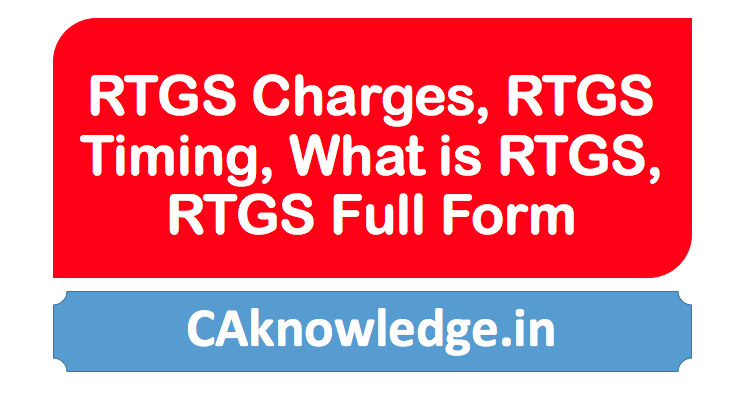RTGS Charges 2024: Real-time gross settlement systems. Every banking company is adapting itself to E- Commerce needs of online banking. It’s easier, convenient and time saving also. RTGS is one of such online banking transfer methods. Let’s understand what it is and also discuss relevant details. Now check more details for “RTGS Charges, RTGS Timing, What is RTGS, RTGS Full Form” from below…..
Quick Links
RTGS Charges, RTGS Timing, What is RTGS, RTGS Full Form
Charges for RTGS
In the case of online transfers, no charges are levied for RTGS transactions. In case the RTGS transaction is completed at a bank branch, a charge of Rs.15 Plus GST is levied, it is also varied bank by bank.
What is RTGS?
RTGS refers to Real Time Gross Settlement. It allows the account holder to transfer the funds from one bank account to another bank account. This includes transfers within different banks. For e.g. if Mr.A wants to transfer funds from his Bank of India to ICICI bank, then he will carry out RTGS for the purpose.
Special – NEFT Charges
Process of RTGS
Unique feature of RTGS is that banking instructions are executed at the time when they are received. RTGS transfers take place within the RBI (Reserve Bank of India) books, hence these transactions are not revocable and can not be canceled once initiated.
Creation of beneficiary
Banks generally have different time limit for verification and approval of beneficiary (the account where the funds are to be transferred to). The beneficiary can be either another person or self owned bank account in any other bank. The transferor needs to mention the beneficiary name, account name and IFSC etc. details. Amongst these details, bank account number and IFSC code are most important as RTGS will take place solely on the basis of these two details.
Payment to beneficiary
Once the beneficiary is approved by the bank, you will receive a message or mail confirming that the beneficiary is active. At such time, you would be able to transfer the funds to such beneficiary through RTGS.
Conclusion of transaction
As per policies of different banks, you may either receive sms alert or mail confirming that the said amount is debited from the account and been transferred to the said beneficiary. This will conclude the transaction.
Points to be noted
- Be doubly sure while entering beneficiary details, especially account name and IFSC code. Wrong or invalid account number of IFSC code could delay approval and in worst cases, they will just transfer the amounts to the wrong accounts.
- Opt for OTP (One Time Password) option for confirmation, because it is more secure and safe.
- RTGS does not have upper ceiling, however minimum amount to be transferred should be Rs. 2 lakh.
- RTGS charges for inward remittance is nil and for outward transactions, charges are as below
RTGS transactions are settled on the real time basis and not in batches. Hence, each transaction will be settled continuously.
- RTGS timings differ from bank to bank, but the RBI has specified following timings for the execution
Monday to Friday and working Saturday – 8 am to 4.30 pm
- RBI has instructed the banks to process the RTGS transaction on the real time basis, which means as soon as the remitting bank receives instructions. However, there may be processing delay which may cause the money to be transferred within 30 minutes or 2 hours.
CONCLUSION
RTGS may be a boon for online banking as the transactions are effected within no time. However, technical glitches or processing delays may cause deferment in funds. Hence please transfer the funds in advance to avoid any last minute delays.
Recommended Articles
- Balance enquiry number
- Types of loans
- Bank Holidays in India
- Sukanya Samriddhi Yojana
- BHIM Aadhaar Payment App
- NEFT FAQ’s
- Masala Bonds
- Sukanya Yojana
- Sukanya Samridhi Yojana vs PPF
- Difference Between ADR and GDR
If you have any query regarding “RTGS Charges, RTGS Timing, What is RTGS, RTGS Full Form” from below links…

